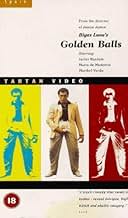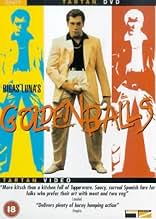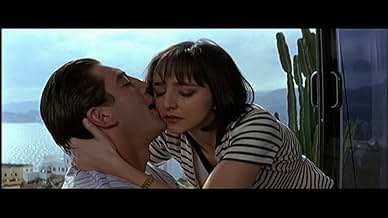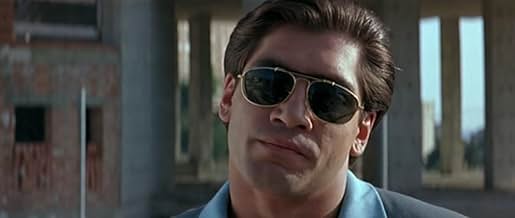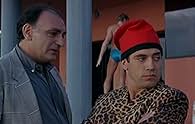Un ouvrier du bâtiment use de son charme et de sa bravade pour tenter d'obtenir suffisamment d'argent pour construire le projet de ses rêves.Un ouvrier du bâtiment use de son charme et de sa bravade pour tenter d'obtenir suffisamment d'argent pour construire le projet de ses rêves.Un ouvrier du bâtiment use de son charme et de sa bravade pour tenter d'obtenir suffisamment d'argent pour construire le projet de ses rêves.
- Réalisation
- Scénario
- Casting principal
- Récompenses
- 4 victoires et 3 nominations au total
Alessandro Gassmann
- El amigo de Melilla
- (as Alessandro Gassman)
Benicio Del Toro
- El amigo de Miami
- (as Benisio Del Toro)
Francesco Maria Dominedò
- El Mosca
- (as Francesco Mª Dominedo)
Francisco Casares
- El productor
- (as Paco Casares)
Avis à la une
This is a generally enjoyable send-up of the excesses of the 1980's:- the get-rich quick, looking after no. 1 culture which prevailed for a mercifully brief period. The anti-hero is a cynical building contractor who will do anything to achieve his aim of making a fortune out of nothing, regardless of the law or of any loyalty to those closest to him. Needless to say, he gets his come-uppance and the final scene in which he smashes a lavatory to pieces is vintage Bigas Luna.
Unfortunately, it doesn't quite manage to keep up the same pace as "Jamon Jamon" and, particularly after about half way through, it starts to lose its momentum and the viewer starts to lose interest. But there are one or two scenes which are so funny that they alone make the film worth seeing, e.g. the three-in-a-bed scene in which he suddenly realises that he is not the fantastic lover he had always imagined he was.
Unfortunately, it doesn't quite manage to keep up the same pace as "Jamon Jamon" and, particularly after about half way through, it starts to lose its momentum and the viewer starts to lose interest. But there are one or two scenes which are so funny that they alone make the film worth seeing, e.g. the three-in-a-bed scene in which he suddenly realises that he is not the fantastic lover he had always imagined he was.
This film is Spanish. This statement is not as obvious as you might think. Bigas Luna makes films so rich in Spanish cultural references that it is true that without previous knowledge, or better yet experience, of Spain then much of the film's charm will be lost. He parodies the stereotypes of spanish culture- the macho male most obviously, but there are numerous others- in such a way that anyone who accuses the characters of being over the top and unbelievable would very nearly be fully justified, if it wasn't that they are so instantly recognizable. Javier Bardem's character has wonderfully kitsch taste, most notably his attire and the obsession he has with Salvador Dali (to the point of outlining the famous 'drawers' across the bodies of all the women in his life). This goes a long way to creating the visual style which is somehow spot on for the mediterranean coast. The story itself is quite touching in the end, as a man of great passion and ambition rises from having nothing to having all he desires before the inexorable decent commences. There is much symbolism in this film for those who enjoy it. For example Bardem aims to erect the tallest building in town, yet as it fails and crumbles, so does his sexual potency. This film is admittedly an aquired taste, not for people who thrive on the tried and tested Hollywood formulae, unless they are willing to explore into the exotic and foreign world of Bigas Luna.
If the darkly comic tone of this film strikes you as a bit odd for what on the surface is a straight forward young-man-on-the-make drama, welcome to the world of Bigas Luna. What this is really is a satire on supposed masculine virtues in Latino culture. The main character, a wannabe real estate mogul played by Javier Bardem, throughout the film achieves material ambitions and rising to dominate others in classic alpha dog fashion, yet his victories seem hollow and shallow. This is all intended, but Luna was not aiming to create a morality play here. He just wanted to take cheap shots at talentless hacks who succeed on sheer chutzpah, and at cultures who lionize them for their successes however achieved. The main character could have been any ambitious rhymes-with-Rick in any field. One gets the idea that he might even have been based on somebody Luna knew from the film business...
Either you like Bigas Luna, or you don't. Huevos de Oro is the middle picture in his trilogy of weird romance films, the other two being the more noted Jamon Jamon and the truly bizarre La Teta y La Luna. All films have breast-obsessed Spanish macho men, sexy young women, love starved 40-ish women, love triangles wrapped around the oddest plots, and the most eyebrow raising sex conversations. All of these films seem to parody the Javier Bardem Spanish macho man character and how he is ultimately ruled by his libido. (The same can be said for most males).
Luna as a director introduced to me to three spectacular, stunning actresses in his films, namely Maria de Mederios, the now famous Penelope Cruz and Mathilda May. He also uses recent Oscar nominee Javier Bardem with great frequency.
In this film, there is a loose plot of a man (Bardem) who wishes to obtain financing for his construction business, and marries a woman he does not love (the wide-eyed Maria de Medieros) in the process. He maintains his passionate relationship with his first and true love, and ultimately gets entangled in his own romantic web. He never gives up his juggling act, until the three main characters come face to face.
What Luna does as a director is take these simple plots and wrap wonderfully strange characters with bizarre obsessions and mannerisms.
This movie has lots of passion, sex, conversation, and twisted romance, all bundled into an enjoyable and unique film. Many will be offended by Luna's unabashed approach to film-making, but this is still a fresh and unique picture. I recommend the three in this series highly. I can not guarantee you will like them, but I can guarantee that you will remember them. ***1/2
out of ****.
Luna as a director introduced to me to three spectacular, stunning actresses in his films, namely Maria de Mederios, the now famous Penelope Cruz and Mathilda May. He also uses recent Oscar nominee Javier Bardem with great frequency.
In this film, there is a loose plot of a man (Bardem) who wishes to obtain financing for his construction business, and marries a woman he does not love (the wide-eyed Maria de Medieros) in the process. He maintains his passionate relationship with his first and true love, and ultimately gets entangled in his own romantic web. He never gives up his juggling act, until the three main characters come face to face.
What Luna does as a director is take these simple plots and wrap wonderfully strange characters with bizarre obsessions and mannerisms.
This movie has lots of passion, sex, conversation, and twisted romance, all bundled into an enjoyable and unique film. Many will be offended by Luna's unabashed approach to film-making, but this is still a fresh and unique picture. I recommend the three in this series highly. I can not guarantee you will like them, but I can guarantee that you will remember them. ***1/2
out of ****.
Lots of rather drrunken partying and explicit sexual activity do not disguise the fact that Golden Balls tells a sad story. Bardem, as Benito the young construction worker consumed with ambitions, aspiration, and sexual desire, is very fine. I would give him most of the credit for making this an interesting film, but Bigas Luna, the director, shows great skill in his handling of Benito's tangled relationships with three women and his slick maneuvering to gain financing for his consuming desire to build the tallest skyscraper in the city. Benito scores success in business and with his women, but in the end meets his downfall, losing money and prestige as his shoddy building practices are exposed. Even worse, it is made clear to him that he is not as good in bed as his gardener, Bob, played by Benicio del Toro in what is little more than a cameo but very convincing.
Le saviez-vous
- AnecdotesSecond part of Bigas Luna's "Iberian Trilogy" also including Jambon, jambon (1992) and La lune et le téton (1994).
- ConnexionsReferenced in Two Girls and a Guy (1997)
- Bandes originalesHuevos de oro
(Theme)
By Nicola Piovani
Performed by the Orchestra dell'Unione Musicisti di Roma
Directed by Nicola Piovani
Violoncello soloist: Francesca Taviani
Meilleurs choix
Connectez-vous pour évaluer et suivre la liste de favoris afin de recevoir des recommandations personnalisées
- How long is Golden Balls?Alimenté par Alexa
Détails
- Date de sortie
- Pays d’origine
- Site officiel
- Langue
- Aussi connu sous le nom de
- Golden Balls
- Lieux de tournage
- Villajoyosa, Alicante, Comunidad Valenciana, Espagne(Playa Casco Antiguo)
- Sociétés de production
- Voir plus de crédits d'entreprise sur IMDbPro
Box-office
- Budget
- 420 000 000 ESP (estimé)
- Durée1 heure 35 minutes
- Mixage
- Rapport de forme
- 2.39 : 1
Contribuer à cette page
Suggérer une modification ou ajouter du contenu manquant



